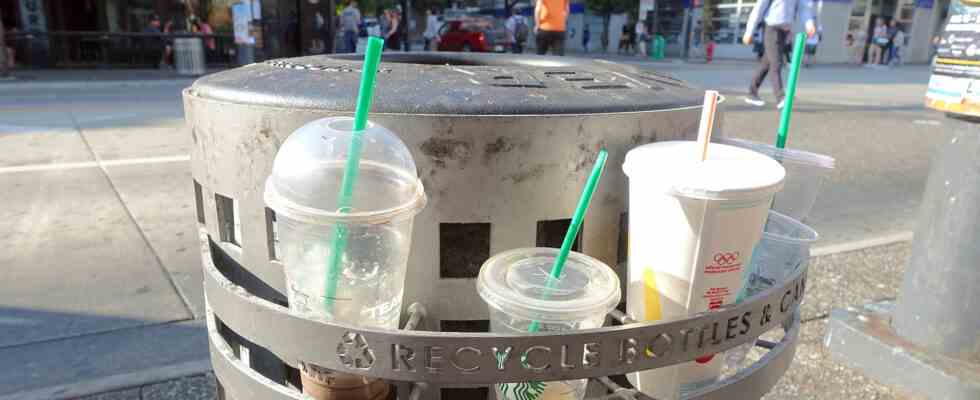Status: 01/28/2023 10:42 a.m
Canadians produce around 38 million tons of plastic waste every year – too much, the government also thinks: A gradual ban should make the country the global leader in the fight against plastic.
“Spare me!” rebuffs a supermarket customer in the Canadian metropolis of Toronto when the cashier reaches for the bag. It’s good that all the plastic waste will soon be over, he says – and praises the government’s most recent initiative: “When you see pictures of oceans full of plastic in the news, of whales, turtles and other animals that are dying because they are plastic eat, I think it’s stupid to use a straw for five minutes and then end up in the sea.”
Bags, plastic crockery and cutlery, stirrers, to-go coffee mugs, six-pack rings: they should be banned from Canada. Like the European Union a year and a half ago, the North American state has declared war on disposable plastic products.
Environment Minister and ex-Greenpeace man Steven Guilbeault has big goals: Over the next decade, 1.3 million tons of non-recyclable plastic waste and more than 22,000 tons of polluting parts such as bottles and cigarette butts are to be avoided. That corresponds to over a million filled garbage bags.
Goal: Zero plastic waste by 2030
The USA’s northern neighbor wants to work hard to achieve the goal that around 200 participating countries also confirmed at the UN World Summit on Nature COP15 in Montreal in December: zero plastic waste by 2030.
First of all, the listed plastic products may no longer be produced or imported in Canada. From December of this year, they will no longer be sold or issued. This gives business people time to adjust, says Toronto store owner Stephen Burger. He now only sells recyclable linen bags, he boasts, as if he’d just invented the idea. That’s how everyone should do it.
Supermarket customer Lisa has now gotten used to it: “At first it took me some getting used to no longer buying sealable plastic bags to store fresh food,” she says. “But since I started using reusable silicone bags, I don’t even think about it anymore.”
The law is particularly effective in cities
Coffee chains like Starbucks or the Canadian diner Tim Hortons have already thought about it: they have banned plastic straws from their range and switched to wooden cutlery or cup lids made from recycled paper fibers.
The law, which came into force at the end of December, is having an effect above all in the cities – even if there is still cheating here and there, observes the President of the German-Canadian Chamber of Commerce in Toronto, Yvonne Denz. “I suspect that one or the other smaller company stocked up again at the end of the year because there was simply a concern that they would have to switch,” she says. “But in the medium term, single-use plastic will no longer exist here.”
20,000 tons of plastic waste end up in the sea every year
According to the government in Ottawa, around 38 million Canadians produce three million tons of plastic waste every year. Only nine percent of that is currently recycled, says Juan José Alava, a marine pollution researcher at the University of British Columbia. “What remains are the problematic plastic parts, which are particularly harmful to the environment and end up in the oceans. We know that here in Canada, 85 percent of plastic waste ends up in landfills. One percent of it – that’s about 20,000 tons – ends up in the ocean every year Sea.”
The production stop for certain single-use plastic products is on A good first step and an important signal to the population, says Alava. But recycling must be significantly improved. Plastic bottles also belonged immediately on the banned list. The same applies to toxic chemicals used in plastic production. Plastic is made with petrochemicals derived from fossil fuels. Carbon dioxide pollution is also associated with plastic pollution.
Trudeau wants to play a leading role
In global rankings for climate protection, Germany’s green energy partner regularly ranks at the bottom. The liberal government of Prime Minister Justin Trudeau has set itself ambitious climate goals – and is trying to play a leading role in climate policy internationally. There is one main reason why Trudeau is unable to achieve his grandiose goals: oil production is at the expense of the environment. The fight against plastic products under Canada’s Environmental Protection Act therefore suits his image very well.
But it’s still not consistent enough, says Sarah King, Greenpeace Canada’s ocean and plastic campaign director. “Definitely the Canadian government is presenting some low-hanging fruit here,” she says. “The plastic products that are now on the list are those that have already been addressed by other laws and treaties – both in Canada and around the world.” Not just six, but all single-use plastic products should be banned very quickly.
Opportunities for German companies?
From 2025 Canada also wants to ban the export of plastic packaging. For the trading partner Germany, this will hardly be noticeable, says Chamber of Commerce boss Denz. canada The main exports to Germany are raw materials. “The plastic in the packaging will play less of a role, maybe a little in the chemical sector. Certainly a little bit in the case of machines.”
But vice versa Canada’s advance has created opportunities for German companies: “Because we are of course further along in Germany when it comes to the whole topic of recycling and companies – especially in the area of consulting for recycling systems – could find a good market.”

